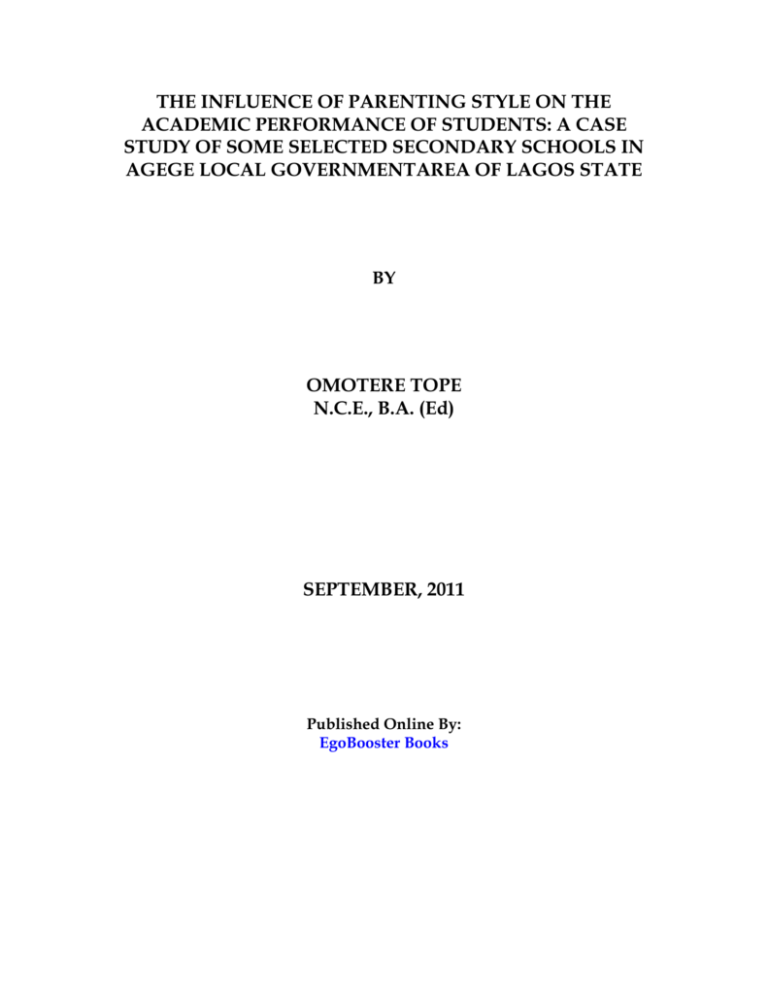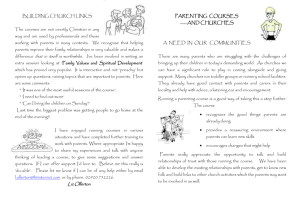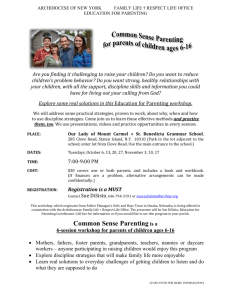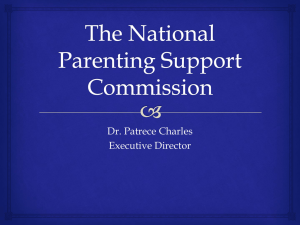
THE INFLUENCE OF PARENTING STYLE ON THE
ACADEMIC PERFORMANCE OF STUDENTS: A CASE
STUDY OF SOME SELECTED SECONDARY SCHOOLS IN
AGEGE LOCAL GOVERNMENTAREA OF LAGOS STATE
BY
OMOTERE TOPE
N.C.E., B.A. (Ed)
SEPTEMBER, 2011
Published Online By:
EgoBooster Books
© 2011 Omotere Tope
Published By:
EgoBooster Books, Ogun State, Nigeria.
All rights reserved.
Identification No: 20
File No: 2011122213
Project Classification: Education.
This research project is right protected. You do not have the right to
modify the content, copy or reprint it. Any attempt to reproduce
this book by any means (photocopy or storage in CDs) is
prohibited. Student researchers using/citing this project should
acknowledge it at their footnotes, endnotes, bibliography or
references. Students are advised to carry out original researches as works
prepared by Omotere Tope have not undergone serious academic supervision
but were meant for commercial purposes.
www.omotere.tk
Office: EgoBooster, Shop 5, Kikelomo Shopping Complex, Ojuri B/S, Ijagun,
Ijebu-Ode, Ogun State.
NIGERIA:
08077447220, 08074472654
INTERNATIONAL:
+234 807 744 7220
2
ABOUT THE AUTHOR
Omotere Tope attended Adeniran Ogunsanya College of Education, OttoIjanikin, Lagos from 2002 to 2006 (N.C.E. in Christian Religious Studies/ History)
and holds a B.A. (Ed) in History and Diplomatic Studies from Tai Solarin
University of Education, Ijagun, Ijebu-Ode, Ogun State. He has undergone
training at the United States Institute of Peace (Online Training Program) with a
certificate of course completion in Conflict Analysis.
He conducts researches (both online and offline) to produce academic works that
students can use for their long essays, theses and dissertations. With access to his
online project database www.omotere.tk, students in Colleges of Education,
Polytechnics and Universities can download full texts of related works prepared
by him and other researchers. This will enable them to read literature reviews,
check for empirical evidences from data analysis and understand the
methodology used.
Contact
Email:
Tel:
Facebook:
Blog:
Website:
Webstore:
omoteretope@gmail.com
08077447220, 08074472654.
www.facebook.com/omoteretope
www.egoboosterbooks.wordpress.com
www.omotere.tk
www.stores.lulu.com/EgoBoosterBooks
3
THE INFLUENCE OF PARENTING STYLE ON THE ACADEMIC
PERFORMANCE OF STUDENTS: A CASE STUDY OF SOME
SELECTED SECONDARY SCHOOLS IN AGEGE LOCAL
GOVERNMENT AREA OF LAGOS STATE
ABSTRACT
This study examines the influence of parenting style on the academic
performance of students in secondary school using four selected
secondary schools in Agege Local Government Area of Lagos State as
case study. One hundred students were randomly selected from
these schools. One hundred parents were also randomly selected
from Agege Local Government. Four hypotheses were developed to
test the correlation between parenting style and academic
performance of students in secondary school Questionnaire was used
to gather data on gender, age, study skills habits, and family
description. To determine parenting style, parents completed the
Parenting Styles and Dimensions Questionnaire, while the students
completed a peer-rating. Data was analyzed using percentage. Also,
as hypothesized, academic performance of students in the selected
schools was significantly positively correlated with a good parenting
style. The research contends that parental involvement at all grade
levels can assist in the academic and behavioral performance of
students. Hence, it is suggested that similar research with relevant
research methodology should be used in carrying out research in
other states of the federation to ascertain the degree of conformity
which this research have on the correlation between parenting style
and academic performance of students in Nigeria.
4
CHAPTER ONE
INTRODUCTION
1.1 Background to the Study
There have been several studies done within and outside Nigeria on
the effects of parenting style on the academic achievement of
students. Research has found many factors that influence how well a
student does in school and the amount of confidence the students
have for themselves. However, in Nigeria, like other growing
economies, families are finding it more difficult to stay connected
with their children’s education. This is most common to families
living in mega cities such as Lagos where both parents work outside
of the home. Carmen (2007) noted that the extended family has
become significantly less extended as mobility has increased. Parents
are becoming isolated from their children and finding it difficult to
keep a careful watch on what needs to be done to help them succeed
5
in school. Many families are not even led by a parent, but by a
grandparent, guardian, or some other adult.
Prior to this time, in what is sometimes called a traditional Nigerian
family environment, parents were able to monitor the school work of
their children carefully and actively participated in Parents-Teachers
Associations purposely to monitor the progress of their children.
Report cards were valued and trusted in the home as an accurate
reflection of academic achievement. Parents were able to keep in
touch with the school and the life of their children in the school, and
to monitor success or lack thereof. When children came home from
school, homework was completed, assignments finished, and other
school works were done.
With the changes in family life and indeed in societal makeup,
schools are now finding it increasingly difficult to keep parents
informed of and actively engaged in the day-to-day progress of their
6
children (Deslandes & Bertrand, 2005). Teachers and administrators
are discovering that the support they once received in getting
students to do their homework is not there, because the parents are
not home to insist that students complete their assignments.
It must be noted that while there are so many factors influencing the
ability of students to progress academically, Ozmert (2005)
emphasized the importance of environmental influence as a major
factor in the development of students academic performance. The
family background of the student, however is the most important
factor that affects the student’s academic performance. In view of
this, Hussain (2006) noted that secondary school students in public
schools often come from economically poor and average income
families. These families face various problems causing emotional
disturbance among their children. They have poor academic
performance. This singular factor shows how important the family is
7
to academic achievement of students in secondary schools as well as
the centrality of parents to the academic performance of students.
Parenting styles have been a major topic of study for the later part of
the twentieth century.
Baumrind (1971) has been credited for
defining three specific parenting styles and their consequences for
children. These are (a) authoritative, (b) authoritarian, and (c)
permissive styles of parenting based on levels of warmth and control
used by the parent in disciplining the child. According to Baumrind
(1991), parenting styles are meant to capture normal variations in
parents attempts to socialize children. Parenting styles can be both
supportive and unsupportive in their tone, both of which affect
developmental
outcomes
and
consequences
to
personality
development. Baumrind described how parenting styles affect
measures of competence, achievement, and social development.
8
Although, students are primarily the ones for whom curricula are
designed, textbooks are written, and schools built, parents are
primarily the ones held responsible for preparing students for
learning – preparation physically, psychologically, behaviorally,
attitudinally, emotionally, and motivationally, just to name a few.
Over the years, numerous theories and associated constructs have
been formulated and have evolved to describe and explain these two
independent variables, that is, parents and students. For example, the
behavioral learning theories of Thorndike, Watson, Skinner and,
Hull, the cognitive learning theories of Piaget, Kolhberg, and
Vygotsky, and the social learning theories of Bandura, have been
used to pose and answer questions about students and parents.
Dornbusch (1996), found empirical evidence of what most parents
and educators know from experience – that parents have a strong
influence on secondary school students.
9
Steinberg and his colleagues conducted surveys, focus groups, and
individual interviews with high school students and parents to better
understand how parents, peers and communities influence students’
commitment to school. The 10-year longitudinal study collected data
from 20,000 students and 500 parents in nine ethnically diverse
school and communities.
These researchers found that parents’
behaviors send clear and decisive messages about their thoughts and
feelings on the importance of schooling.
They also found that
parenting style helps or hinders a child’s engagement in school; that
encouraging a child to do well in school or insisting that homework
be completed were important forms of promoting engagement. These
three tenets – communication, influence, and parenting style – are
subsets
of
a
larger
domain,
parental
involvement.
The
aforementioned studies are not the only ones that speak to the issue
of parenting style, but, here, serve only as a way of introducing the
broader sphere. In this present study, parenting style was studied in
10
reference to its influence on the academic performance of students in
secondary school.
1.2 Statement of the Problem
Although, scholars have identified the correlation between parental
influences on children academic performance in the primary school,
it must be noted that secondary school students are different from the
typical elementary-aged children and therefore reacts differently to
direct parent involvement in their academics. The focus and indeed
the intent of this study concern the relationship between parenting
style and secondary school students’ academic performance.
1.3. Objectives of the Study
The primary aim of this study was to examine the influence of
parenting style on students’ academic performance. This general aim
is expressed in the following specific objectives which are to:
11
1. Examine the correlation between parenting style and academic
performance of students in secondary school;
2. Examine factors determining parenting style;
3. Investigate the effects of parenting style on student’s academic
performance;
4. Examine the perceptions of students towards their parents in
regards to parenting style and their academic performance.
1.4 Research Questions
1. What relationship exists between the type of parenting style and
secondary school student academic achievement?
2. Do socio-economic and educational background of parents affect
their parenting style towards their children in secondary schools?
3 Do parenting style and parental involvement directly affect
students academic performance?
12
4 Do perceptions of students about their parents affect their
academic performance?
1.5 Research Hypotheses
Four hypotheses were formulated based on the research questions:
H01: There is no statistically significant relationship between
parenting style and academic performance of students in secondary
school.
H02: There is no statistically significant relationship between socioeconomic and educational background of parents and their parenting
style.
H03: There is no statistically significant relationship between
parenting style and parental involvement and academic performance
of students.
H04: There is no statistically significant relationship between the
perceptions of students about their parents and the academic
performance of students in secondary school.
13
1.6 Scope and Limitations of the Study
The following limits were set:
1. The study was limited by a convenience sample of approximately
100 (one hundred) students from five secondary schools and 100 (one
hundred) parents from Agege Local Government Area of Lagos State.
2.
The sample was limited to students in from Agege Local
Government Area of Lagos State.
3.
It is recognized that not every parent will fit neatly into a
particular parenting style. These parent-child pairs will be discarded
from sample.
4. Some children will rate their parents as fair when in actuality they
are not, therefore there will be some bias in the parents nominations.
5. It is recognized that a parenting style may be chosen by a family
due need rather than desire.
6. The study was limited to the students whose parents gave consent
for their participation, as well as, receiving the students’ assent.
14
7. The accuracy of the data was limited by the skills of the researcher
and validity of the tests administered.
1.7 Significance of the Study
This study will be used to many people who may want to know the
factors that could make or mar student’s academic performance.
Therefore, the study is significant in the following regards:
1.
It has provide empirical evidence to schools, parents, and
students about the nature of parenting style and how it affects the
academic performance of students
2. It offers a reference for future research that might investigate the
same variables.
15
1.7 Operational Definition of Primary Variables
Parenting Style: The overall emotional climate of the parent-child
relationship- an affective context of sorts that sets the tone for the
parents interactions with the child.
Parent: The term parent as used in this study includes, in addition to
a natural parent, a legal guardian or other person standing in loco
parentis, such as a grandparent or stepparent with whom the child
lives, or a person who is legally responsible for a child’s welfare.
Student academic achievement: This term refers to the student’s
overall average
in science, social studies, English, and math,
expressed as a percent grade.
Parental
Involvement:
any
form
of
verbal
or
non-verbal
communication or assistance in reference to a child’s homework.
16
BUY THE COMPLETE PROJECT
PRICE
CALL
08077447220
08074472654
+2348077447220
NIGERIA: N3000
INTERNATIONAL: $40
PAYMENT OPTIONS
OFFICE
5, Kikelomo
Shopping
Complex,
Ijagun, IjebuOde, Ogun
State,
Nigeria.
NIGERIA
Cash Deposit
NIGERIA
Cash Deposit
Bank: Guaranty Trust Bank
Account Name: Omotere Tope
Account No: 0050329679
AMOUNT: N3000
Bank: Intercontinental Bank Plc.
Account Name: Omotere Tope
Account No: 1014785737
AMOUNT: N3000
INTERNATIONAL
Section [A]
Payment:
Send to:
Location:
Amount:
Western Union Money Transfer
Omotere Tope
Lagos State, Nigeria.
$40
Section [B]
Sender’s Full Name:
17
Location of Sender (Where Money Was Sent From):
Money Transfer Control Number (MTCN):
Test Question and Answer (if applicable):
Send details of payment to: +2348077447220
omoteretope@gmail.com










